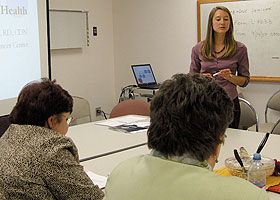  |
| HOME | THIS ISSUE | CALENDAR | GRANTS | BACK ISSUES | < BACK | NEXT > |
Dietitian offers weight management course for cancer survivorsby Chris DeFrancesco - November 13, 2007 | ||||
| Many people, when they find out they have cancer, promise themselves they’ll do whatever it takes to beat it. Once the last round of therapy is over, the time is right to make good on that promise by committing to a healthier lifestyle, says Rachel Rodek, an outpatient oncology dietitian at the Health Center’s Carole and Ray Neag Comprehensive Cancer Center. “Nutrition and weight loss are very important for survivorship,” Rodek says. “To help prevent a recurrence, or development of other cancers, weight loss has been shown to be a key factor. This is especially true for hormone-based cancers, such as prostate and breast. With these, the patients receive therapies that typically result in weight gain, and these extra pounds cause increases in circulating hormones, which increase the risk of recurrence. So getting that weight off is really important.” This fall, Rodek introduced a five-week “Weight Management for Survivorship” course, and her first class of five students “graduated” Oct. 31. “We’re eating healthy, and it’s preventing disease,” says one of the participants. “Rachel gave us a way to find optimal health for ourselves. I wish I knew this as a young person.” Rodek says she designed the course with cancer survivors who’ve completed therapy in mind. “We really don’t want patients to start losing weight while they’re still receiving either radiation or chemotherapy,” she says. “A significant drop in weight can change the toxicity of chemotherapy or, if the patient is undergoing radiation, it can change their position on the table, altering the exact location of the beam. But more importantly, weight loss during therapy can prolong recovery time and wound healing, and decrease tolerance of the side effects of therapy.”
Still, says Rodek, the lessons are useful to anyone who would benefit from losing weight. “Just general healthy eating can help decrease the risk of developing several illnesses, such as diabetes and heart disease,” she says. “So patients who follow a healthy diet are helping themselves not only in terms of keeping the cancer at bay, but also by helping prevent other health issues that are linked to a heavier weight.” Among the topics the course covers are: changing nutrients to make a diet healthier; portion sizes and nutrition labels; improving eating and lifestyle habits; making healthy choices at restaurants; and maintaining weight loss. Pamela Goulet, a clinical coordinator at the Neag Cancer Center who works with cancer survivors, says she lost 11 pounds in the first three weeks of the class. “It’s unbelievable all the things I didn’t know for years, like how to shop, how your plate should look, just the little tips she’s given us: types of menus, how to be more creative with vegetables and organic things, and how to substitute more natural grains for starchy things so you’re actually getting the best nutrition,” Goulet says. “It’s a natural way to help yourself.” She plans to offer another session early next year. Details will be available at 860-679-7692. |
| ADVANCE HOME UCONN HOME |

